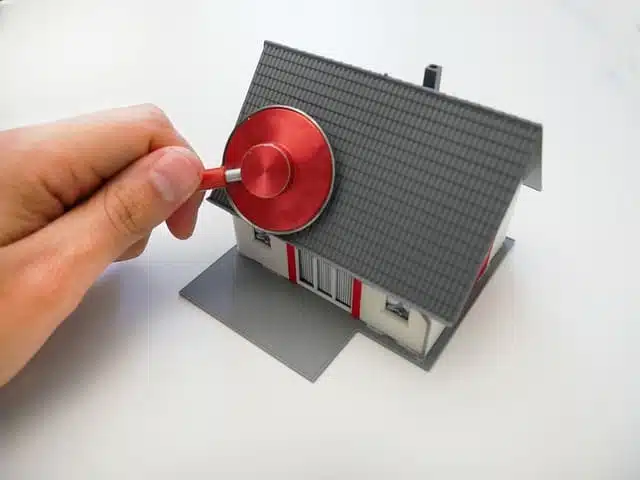Currently Empty: $0.00

If you’ve never bought or sold a property before, the process may appear difficult. A home inspection is an important stage in the process of selling your house.
A house inspection tries to document any issues prior to the sale of the property. Learn more about house inspections, including how long they normally take.
What is a Home Inspection?
A house inspection occurs prior to the sale of a home, when an independent home inspector analyzes the home and its principal components to discover any flaws. Home inspectors report on issues that may impair a home’s livability, safety, or resale value. Cosmetic flaws are not noted during home inspections.
Although a home inspection is a rigorous process that may find various flaws, it is crucial to realize that the inspector is only able to examine what is visible and cannot remove finished wall coverings, stored things, and so on.

A home inspection is normally not needed, although a buyer may request one before closing on the transaction. If substantial flaws are discovered during the home inspection, discussions may be reopened.
How long does a Home Inspection take?
A house inspection normally takes two to two and a half hours, however this might vary based on the size of the home and its components. Smaller properties, like as condos, can be completed in half the time as a house. Inspection reports often take one or two days to complete.
How to Choose a Home Inspector
Buyers usually contact their real estate agent to obtain a house inspector. A real estate agent can undoubtedly recommend an excellent house inspection, but it’s critical to understand the interaction between a real estate agent and a home inspector. An unscrupulous real estate salesperson may put pressure on a home inspector to rush through an inspection in order to sell the house quickly.
What to Expect From a Home Inspector
- Experience
- Certifications – Some states require home inspectors to be licensed or certified, but not all. The International Association of Certified Home Inspectors® is a useful resource for learning about home inspector certification. Also check out the American Society of Home Inspectors.
- Insurance
- What will be inspected and documented in the report?
- What tools will they use to inspect the house?
How much does a Home Inspection Cost?
A home inspection might cost between $200 and $500, depending on the size of the house, location, and scope of the inspection report. Before hiring a home inspector, get many quotations from them.
What to do Before a Home Inspection?
If you’re a seller, you should conduct a pre-inspection and keep maintenance materials for significant components (such as HVAC, electrical, and plumbing) organized. Any keys that the inspector will require should be ready and available. Access to major home components should be obvious. Any pets should be secured or removed from the home, and the electricity to all appliances and components should be turned on.
What Does a Home Inspector Look at?
- Plumbing
- Electrical
- HVAC
- Roof
- Kitchen and bathroom
- Gutters
- Windows and doors
- Appliances
- Lawn sprinklers.
- Ceiling
- Interior walls
- Basement
- Sidewalk/driveway
- Garage
- Patios/decks
When does a Home Inspection take place?
A home inspection occurs after a seller accepts an offer but prior to the actual sale of the home. It allows buyers to renegotiate items uncovered during the inspection. The home inspection procedure can take seven to ten days during the home-buying process, but reports are often ready a day or two after the examination.
What Happens Following a Home Inspection?
Depending on the findings of the research, buyers and sellers might proceed with the final sale of the home or negotiate issues identified by the report. Buyers can request that the seller perform repairs if necessary, or they can agree to a repair credit, which is a deduction from the sale price that allows the buyer to pay for repairs. If the flaws become serious enough, the sale may fall through, and the seller may be forced to withdraw the listing in order to make repairs.
Who pays for a Home Inspection?
A house inspection is often paid for by the buyer as part of their due diligence process.
How has Covid-19 affected Home Inspections?
The Covid-19 outbreak has transformed the way house inspections are conducted. Typically, buyers attend the home inspection with the inspector, but this has altered as social distancing norms have evolved. Buyers may not attend the inspection, emphasizing the need of follow-up communication after the report.
Before the pandemic, inspectors met with buyers after their inspections to answer questions. These talks now take place over the phone or over email, and they are increasingly vital for purchasers to understand the content of a report.
Home Inspection Tips for Buyers
- Research home inspector reviews.
- Ask if they provide thermal imaging camera analysis or other in-depth inspection techniques.
- Request for a sample report.
- Ask for a disclosure statement.
- Consider structural components such as the foundation, walls, fixtures, doors, and windows.
- Check for water damage.
- Test the lights.
- Inspect the roof and chimney, if present. Ensure the inspector has access to all places and keys.


